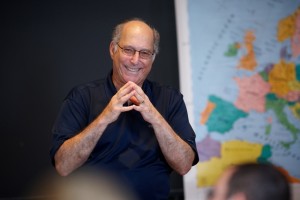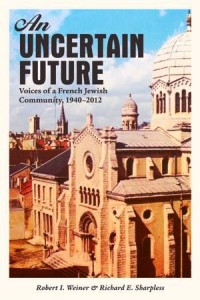Robert Weiner, Jones Professor of History, and Richard Sharpless, professor emeritus of history, have completed An Uncertain Future: Voices of a French Jewish Community, 1940-2012, published in August by University of Toronto Press.
The book, almost 20 years in the making, has been a labor of love for Weiner, who visits Dijon, France, an old city with still-maintained 15th century structures and a population of about 250,000, each year. Since 1993, he has been interviewing members of the Jewish community there, chronicling its reconstruction from World War II and its slow decline during the last two decades.

Robert Weiner, Jones Professor of History
What began as a research interest quickly became a deep connection and friendship with the community and its members. Weiner visits Dijon regularly because he “must visit his friends.” Those friends are the cornerstone of the book, providing an oral history in the form of 24 first-hand narratives on issues such as the lingering impact of the Holocaust, anti-Israeli sentiments, and intermarriage within and outside the community. They include the community’s rabbi, the president of its synagogue, a Jewish deputy mayor, Holocaust survivors and their children, and representative members from the Lubavitch (ultra-Orthodox) community.
What makes Dijon so compelling, explains Weiner, is its rich diversity. Studying Dijon, he says, is like studying the world Jewish community. Everyone living in Dijon moved from somewhere: Poland, Germany, Israel, Iran, Morocco, Algeria, Tunisia, Libya, and the list goes on. And it’s not just geographical diversity; there are Catholics, Protestants, and occasionally Muslims all interwoven in the community.
“I have seen the community go through many phases and changes, strengthening itself, explaining Judaism to the wider community, opening up its doors for national patrimony days,” says Weiner. “It’s a community that moves, adjusts, evolves.”
Friends and colleagues for over 40 years, Weiner and Sharpless worked together on every aspect of the project. While Weiner conducted almost all of the interviews, Sharpless edited the nearly 4,000 pages of transcripts into a reader-friendly book. During a trip to Paris and Dijon, Weiner introduced Sharpless to key members of the Dijon community and took him to the major Jewish sites of Paris.

An Uncertain Future
“Dealing with a topic as harrowing and sensitive as recent Jewish life in France, we both believed that two sets of eyes offered better perspective than one,” explains Weiner. “Ironically and unbelievably, however, our conclusions were almost entirely unanimous throughout.”
Numerous students have contributed to the work over the years through the EXCEL Scholars undergraduate research program. A portion of the book is a translation of about 25 pages of Dijon’s community journal, now called Mazal Tov. Julie Depenbrock ’13 (Fulton, Md.), a French and English double major, and Audrey Hughes ’14 (Huntington, N.Y.), a French major, are translating journal articles for publication on Lafayette’s website. Weiner and Sharpless will publish about 200 pages of translation this year and expect to publish an additional 150 pages next year, creating an important online primary source repository for students and scholars everywhere. English and French graduate Clarissa Lerch Louw ’94, economics graduate Maria Mitova ’09, international affairs and French graduate Vanida Narrainen ’09, and international affairs graduate Acelya Yonac ’01 were especially instrumental in the book project; approximately 10 other students also contributed since the project’s beginning.
Given his familiarity with Jewish civilization – a cantor, Weiner also serves as the College’s Jewish chaplain and has been director (now co-director) of the College’s chapter of Hillel Society for 44 years – he became a virtual member of the Jewish community of Dijon. He has attended many events typically closed to non-members, including B’nai B’rith meetings, anti-racism events, bar mitzvahs, weddings, and is often invited to lead the conclusion of services at the synagogue. Gathering oral histories requires trust, and each time Weiner travels to Dijon, he easily visits with about 15 families, something even many French scholars cannot do.
The community’s decline is something Weiner has seen coming for some time. Despite the challenges of the older generation passing, younger generation migrating to larger cities like Paris, and the division of the community due to the Lubavitch movement, Dijon remains fiercely committed to demystifying Jewish religion and culture and to preserving Jewish traditions.
“Dijon is a small community and no longer a particularly wealthy community, but it’s a community of talent,” says Weiner. “These people are so dedicated to fighting for a secure and integrated place for Jews in France, but also fighting against unfair anti-Israeli propaganda that sometimes dominates the French media. They took risks following the war and developed a strong, dynamic community. Some people in Dijon lost 50-plus members of their family to the Holocaust. When they see a rise in anti-Semitism, they react. Two of the most hopeful things I have seen are the increasing presence of Catholics and Protestants in support of the community, including at public demonstrations, and the larger leadership role women are playing in the moderate part of the community.”
Weiner has given talks on the Jewish community of Dijon in the U.S., Canada, Belgium, Israel, and France. He presented his work at the Western Society for French History Conference in Banff, Alberta, Canada, this month. In November, he will travel to France to give talks at the Jewish community center in Dijon and a synagogue in Paris.
Weiner and Sharpless also are grateful to the editors at the University of Toronto Press for their professionalism. Their book is available through Amazon and the College’s bookstore.


1 Comment
Comments are closed.